On the 11th July the full AgriFoRwArdS student team, along with several supervisors and CDT leadership convened at the University of East Anglia for the July quarterly CDT progress review.
This session involved speakers from across the cohorts presenting in the style of PechaKuhca which is a presentation method that calls for telling a story, using images rather than reading text from slides, during a PowerPoint presentation. One key constraint is that only 20 slides, each showing for just 20 seconds, is allowed. This made for a fun session.
As the event was held at the University of East Anglia this meant an early start for Lincoln students with some needing to start off at 05:30. However, those at Cambridge were lucky to have a little bit of extra time departing at 08:00. The session began at 10:00 sharp, with an arrival coffee, at the Julian Study centre.
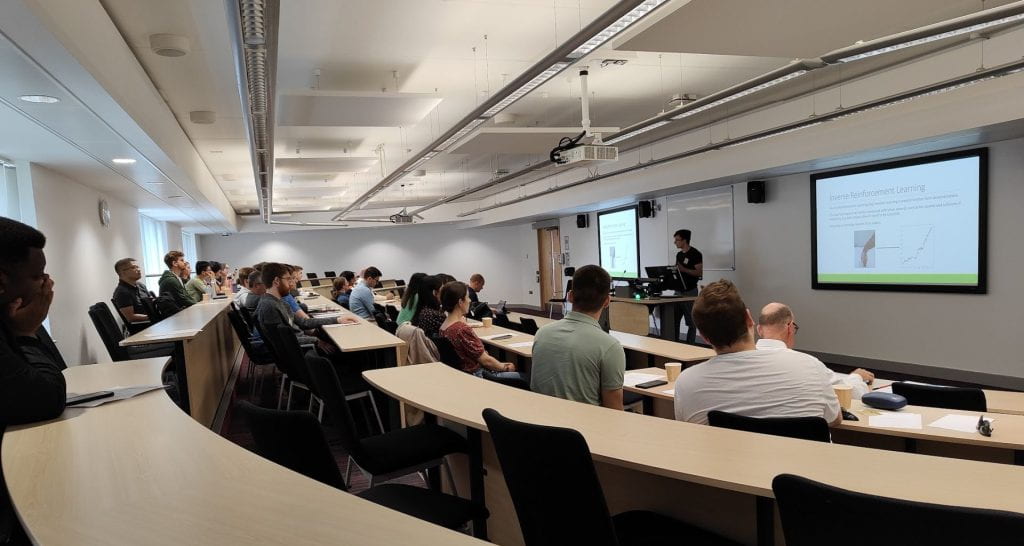
At 10:15 we were welcomed by our host Prof Richard Harvey, Co-Investigator of the CDT, who introduced the running of the day. The first session started at 10:20 with five presentations. These ranged from James Bennett’s research on simplifying tone curves for image enhancement, to Xumin Gao’s work on automated aphid counting based on deep learning in unstructured environments.
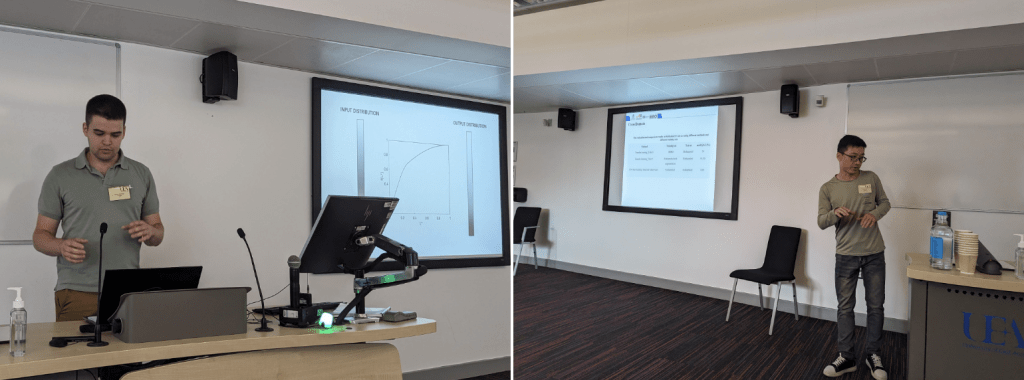
15 minute breaks were included in between sessions to help re-set the session for the next presenters. Session 2 then started promptly at 11:30. Here James Bennett hosted the session, with the role of introducing the speakers and supporting the Question and Answer sections for each presenter. Session two consisted of speakers from multiple cohorts – it demonstrated work that was just at its initial stages, and we also heard from students who are concluding work in their PhD. This was great to see and helps students get a sense of what lays ahead.
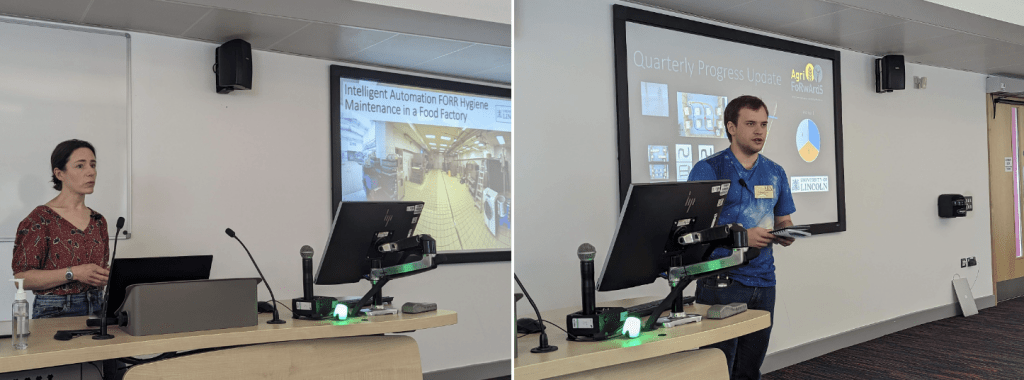
Once session 2 had concluded, lunch was served at the wonderful Sainsbury Centre. The Sainsbury Centre is an international art museum, home to world-class art collections from contemporary to anthropological and archaeological themes. Following lunch, there was the opportunity to explore the gallery. This was also a great time to search out and reconnect with cohort members and check-in one everyone!

The final presentation session started promptly at 13:55, with the final suite of 5 speakers. Here the theme extended from designing supply chain for nutritional delivery, across to 3D printing soft robotics, and we heard how AR/VR tools affect multi-perspective technology decision making. This last session was as excellent as the first, and the continued high level of presentations was a credit to the all the presenters involved.
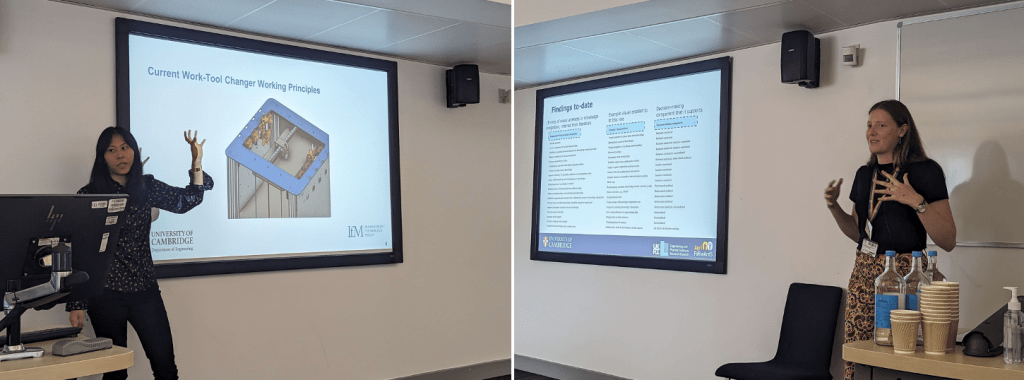
The event concluded with a panel discussion on natural Capital Assets. This was held by Prof Brian Reid of UEA. Prof Reid is the Associate Pro Vice Chancellor for Research and is professor of Soil Science. His research focuses on soil carbon; high carbon soil amendments e.g. biochar and paper crumble; soil interactions with contaminants agrochemicals, antibiotics and nutrients; the fate and transport of these agents in association with soil colloids and organic matter; contaminated land; remediation, and; pollutant risks and ecotoxicity.
This was an engaging event, with several sections of interactivity to try and brain-storm ideas about how we can improve the local, natural economy. The main base of this talk was around how carbon capture and soils can play a growing and critical role in supporting climate change solutions towards Net Zero.

As the busses were waiting, we were under strict instructions to depart at exactly 16:00 or get left behind! From discussions on the way home many students commented how the event was one of the best July progress review meetings held so far, and although the PetchaKucha was a different way of presenting, it made the day unique to previous events.
Andrew Perrett, part of Cohort 4, commented:
“The day was very enjoyable, and as someone who has never been to another University, very interesting. Richard Harvey gave a couple of us a brief tour at lunch time which was a nice touch, and the lunch was excellent. Always nice to catch up with other cohorts as our cohort will be in their position next year. Seeing and hearing others present does give us a heads up as to what works and what does not presentation wise, is very useful. A very worthwhile day.”
A huge thank you to all the presenters who are listed below along with their topics:
Session 1: Host Prof Richard Harvey
- James Bennett (UEA) – Simplifying Tone Curves for Image Enhancement
- Kyle Fogarty (Cambridge) – Neural Geometry Processing
- Rachel Trimble (Cambridge) – Interface Design for Novel Reinforcement learning Environments
- Elijah Amanzor (Cambridge) – Static Shape Control of Soft Continuum Robots using Deep Visaul Inverse Kinematics Models
- Xumin Gao (Lincoln) – Automated Aphid Counting Based on deep Learning and Robotics Technology in Unstructured Environments.
Session 2: Host James Bennett
- Paul-David Zuercher (Cambridge) – Decision Assistance Systems for Manufacturing Operations Management
- Emlyn Williams (Lincoln) – learning From Video Demonstrations
- Jack Foster (Cambridge) – Towards Robust Continual Learning with Bayesian Adaptive Moment Estimation
- Amie Owen (Lincoln) – Intelligent Automation FORR Hygiene Maintenance in a Food Factory
- Vijja Wichitwechkarn (Cambridge) – MACARONS: Modular Automated Crop Array Online System
- Samuel Carter (Lincoln) – Learning robot navigation and manipulation from demonstrations
Session 3: Host: Harry Rogers
- Bethan Moncur (Cambridge) – How do AR/VR Tools Affect Multi-perspective Technology Decision-making
- Callum Lennox (Lincoln) – Real time vision Based Sport Spraying Development for High Efficiency and Precision Weed Management
- William Rohde (Cambridge) – Feedback Control pf Plant Growth as a Multi-Agent Problem
- Haihui Yan (Cambridge) – 3D printing Soft Robotic Grippers for Automated Strawberry Harvest
- Garry Clawson (Cambridge) – Designing Food Supply Chain for Nutritional Delivery and Traceability
A huge thank you to Prof Richard Harvey who led the day and to Joanna Blackman for making the day as enjoyable as it was. Also, a huge thanks to UEA students Harry Rodgers and James Bennett for hosting the presentation sessions.
Do you want to get involved in the CDT?
If you are interested in learning more about what we do and if you share a passion for agriculture and technology then go to our AgriFoRwArdS CDT website to see more about our research, how you can be involved, and how to apply to be a student in the program.
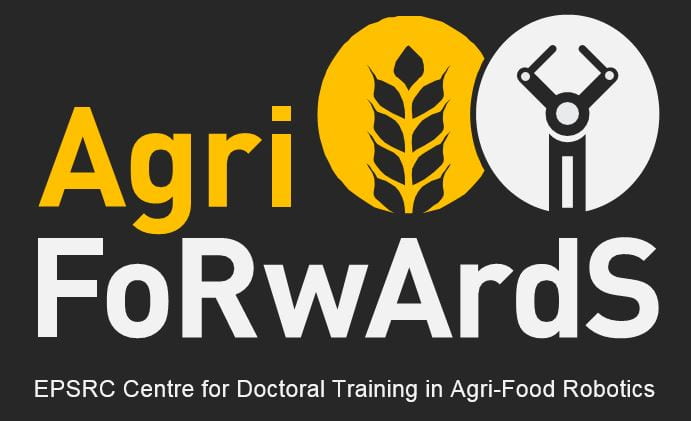

Be First to Comment